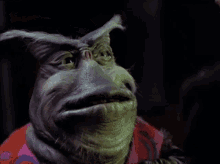- Joined
- Dec 3, 2024
- Messages
- 5,390
- Reaction score
- 7,614
- Points
- 10,977
I can understand the "anthropocentrism" but I'd still say that opposable thumbs made it vastly easier for us to be able to produce everything we're seeing around today.I've read into the idea before but for me I felt it was all a little too anthropocentric. I think life is just far too weird and wild to be so rigid in its design. On earth alone we have termites that have constructed cathedral like structures as tall as 8-metres and slime mold (an entirely brainless organism) that is capable of navigating complex mazes; we simians just conquered the world before anything else could. *flash forward 30 years from now - post-space-conquest-era - and I'm seething at my neighbor who is a blue human from Gleepios IV*
Termines can construct complex structures and slime mold can navigate mazes but ultimately those two species are just adapted for one task and cannot create any form of art nor complex technologies. Even crows which are smart enough to use simple tools cannot go beyond simply because they're limited by their beaks.
Also I'd say that most species are still unable to simply ask "why" regarding things around them nor trying to tell themselves how they could replicate them.
It's not just about being smart and having opposable thumbs but also having that "thing" that made us want to see beyond the sky.
Thanks.Aleister Crowley. Reading into their life is definitely a healthy decision...
I also think that StarCraft's Zerg were inspired by them. But you could argue that there was also Starship Troopers that popularised the "invading insect-like alien" trope.Tbh, Xenos as it's used in 40K is probably directly inspired by Aliens - there is a lot of Aliens DNA in early 40K.
Alien has had its meaning altered from "foreigner" to "not from Earth" thanks to pop culture...Yeah, I never liked the derogatory term alien but if I'm being perfectly honest, even though it's the theme of this thread, I don't like the term alien full stop. Like, cause what do you even mean when you're saying that? Like the alien in Alien (1979) was assumedely found on it's home world - the humans were the "aliens". Maybe I'm being fussy, but it seems like a term primarily designed to segregate, and outside of the context of me wanting to tweek out on some forum, I probably wouldn't use it even if I was talking about an organism found on Europa or some shit.
In a funny way we are the aliens if we were to come to their home-world instead.
Ah yeah, I liked The Colour Out of Space. I should read the other ones too.Hey btw, if you have never read any H.P.Lovecraft stuff, based on your picks, I think you might like stories involving Elder Things (the species - not to be confused with Great Ones which is Cthulhu and co). I was reading At the Mountain of Madness today and it just came to me. I don't wanna spoil too much but they're basically proto-humans - not in morphology but in their advocacy towards scientific endeavour.
"The Thing" novel is almost feeling like a lovecraftian horror story.









 ) I hope they look like that and not Greys.
) I hope they look like that and not Greys.